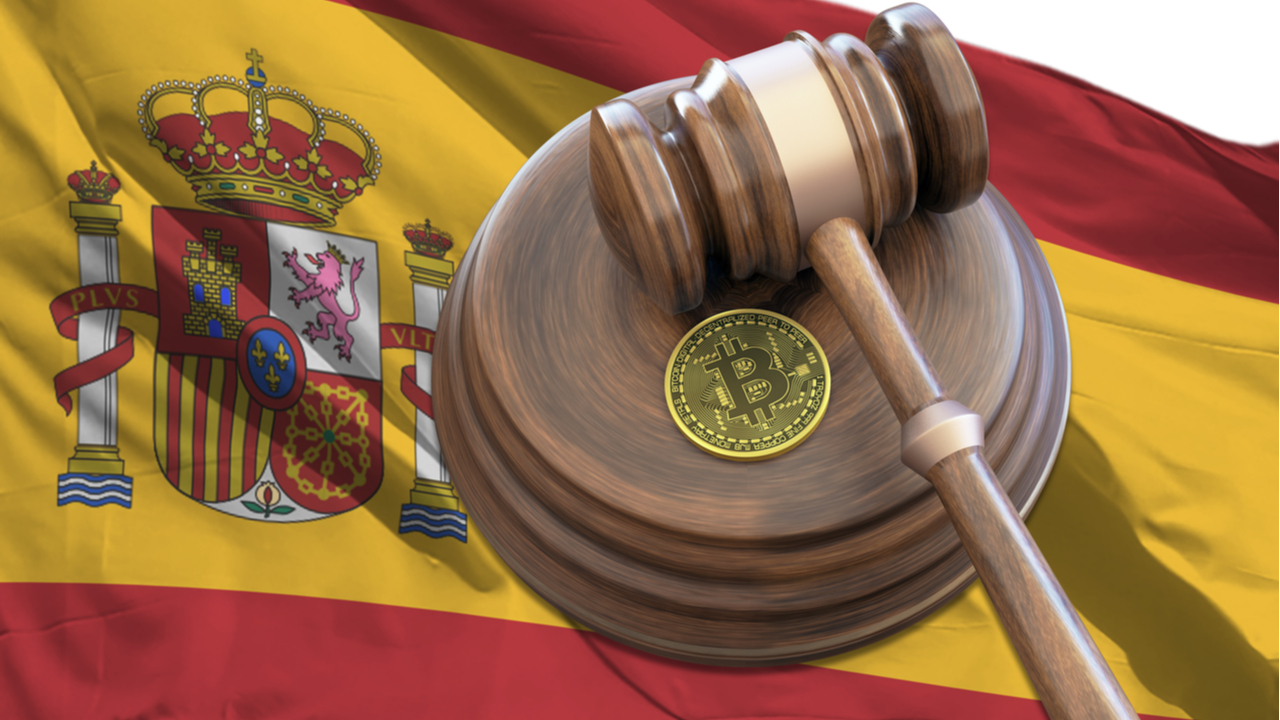 Spanish banks are preparing for the possibility of offering crypto assets directly to their customers. According to new regulations, the Bank of Spain must formulate a list of virtual asset service providers and custody companies. However, these institutions are still not sure if they must apply, because banks already comply with anti-money laundering directives derived […]
Spanish banks are preparing for the possibility of offering crypto assets directly to their customers. According to new regulations, the Bank of Spain must formulate a list of virtual asset service providers and custody companies. However, these institutions are still not sure if they must apply, because banks already comply with anti-money laundering directives derived […] The National Police have issued a warning for a wave of cryptocurrency-related investment scams in Spain. The amount that has been lost in these kinds of investments recently is €240,000 related to just two complaints. However, there has been a rise in the complaints presented by citizens due to the popularity that these financial instruments […]
The National Police have issued a warning for a wave of cryptocurrency-related investment scams in Spain. The amount that has been lost in these kinds of investments recently is €240,000 related to just two complaints. However, there has been a rise in the complaints presented by citizens due to the popularity that these financial instruments […] Clients of BBVA Switzerland will be able to buy, store, and trade crypto assets with a digital account that comes with a cryptocurrency wallet. The new banking product will be available across the European Union as well as in a number of markets in South America. BBVA Switzerland Account Facilitates Cryptocurrency Investments The Swiss subsidiary […]
Clients of BBVA Switzerland will be able to buy, store, and trade crypto assets with a digital account that comes with a cryptocurrency wallet. The new banking product will be available across the European Union as well as in a number of markets in South America. BBVA Switzerland Account Facilitates Cryptocurrency Investments The Swiss subsidiary […] The authorities of Spain must prepare a registry of cryptocurrency exchanges and custody providers to comply with legal requirements to address transparency and terrorism financing issues. This registry is specified by the Prevention of Money Laundering and Financing of Terrorism Law, approved last year. The process, which started in April, gives these service providers until […]
The authorities of Spain must prepare a registry of cryptocurrency exchanges and custody providers to comply with legal requirements to address transparency and terrorism financing issues. This registry is specified by the Prevention of Money Laundering and Financing of Terrorism Law, approved last year. The process, which started in April, gives these service providers until […]
The National Securities Market Commission in Spain issued warnings on 11 entities for not being registered for investment services.
Regulators around the world continue to keep the pressure fresh on crypto businesses. Spain’s National Securities Market Commission (CNMV) is the latest to issue a warning on several crypto- and financial market-related businesses for unregistered services.
According to the official document, CNMV has issued warnings on 11 entities on Aug. 16 for not being registered in the corresponding registry of the commission. The listed entities, which include major crypto trading platforms such as Huobi and Bybit, are not authorized to provide investment services within Spain.
CNMV’s consulting page states that only registered companies have the authorization to provide services related to securities. While the securities watchdog does not have the authority to directly ban an entity from operating in the country, CNMV can appeal to the court. A November report from Crypto Company Guide in Spain revealed about 120 crypto companies are already registered and operating in Spain.
Spain established a rather friendly environment for crypto frims last year. As Cointelegraph en Español summarized, the Committee on Economic Affairs and Digital Transformation approved a law to create a sandbox for financial technologies.
Speaking to Cointelegraph, University of Seville Professor Ismael Santiago said that the sandbox would favor “the creation of new value-added jobs, technological development and economic competitiveness.”
Related: New Spanish bill aims to enable mortgage payments in crypto
More recently, the Spanish Socialist Workers’ Party introduced a non-law proposition to launch a national digital currency in a response to the European Central Bank’s experiments with the digital euro.
The proposal states that a national digital currency would enable higher liquidity if a monetary expansion is necessary. It allows a more direct mechanism by injecting liquidity directly into current accounts and thus transferring it immediately and without intermediaries.

The financial package for Argentine soccer star Lionel Messi’s much-anticipated move to Paris Saint-Germain includes payment in crypto fan tokens, sources claim.
Argentine soccer superstar Lionel Messi, regarded as one of the game’s greatest players of all time, has reportedly made crypto fan tokens a part of the payment deal in his financial package with French club Paris Saint-Germain. The information comes from sources close to the matter, according to Reuters.
Messi, 34, who had been at FC Barcelona since he was 13, this week signed a two-year contract with Paris Saint-Germain (PSG), with an option to extend for a third year. His departure from Barcelona, with which he won four Champions League titles, was sealed after Spanish La Liga’s financial fair play rules made it fiscally unviable for the club to continue to afford the star player.
Messi has won the European Golden Shoe award for top scorer and FIFA’s player of the year award six times each and will reportedly net an annual salary of $41 million (plus bonuses) in addition to a $30-million signing bonus at PSG, reports claim. PSG president Nasser Al-Khelaifi has said at a press conference this week that should the precise figures for the deal be made public, people would be “shocked, honestly, at the numbers we have.”
With the exact details still shrouded in secrecy, the allocation and terms of the inclusion of crypto fan tokens in Messi’s contract are unknown. Cointelegraph has reached out to PSG for comment and will update this article with further information should it be forthcoming.
Related: Crypto fan tokens a mixed bag for game-deprived soccer fans
Fan tokens continue to be popular in global sports, with major Turkish multi-sport club Fenerbahçe S.K. completing an initial presale of 500,000 tokens on Ethereum this week, netting the club $1.75 million in 30 seconds.
PSG has itself been involved in crypto since 2018 through its partnership with the Socios blockchain platform, which also counts Messi’s former club FC Barcelona as a partner alongside a host of other international, high-profile clubs that include Atlético de Madrid, Juventus, Manchester City and many others.
Flash sales for fan tokens are undeniably lucrative for the clubs involved and became even more prevalent during the pandemic-induced lockdowns last year as a way to enhance clubs’ digital presence, boost revenue and maintain fan engagement. Yet critics of the model have argued that the voting rights associated with token ownership offer fans little more than a cosmetic say in clubs’ operations and represent a gratuitous monetization of fan engagement.

Lawmakers in Spain are proposing a new law that would allow homeowners to pay their mortgages using cryptocurrency. The legislation, submitted by members of the People’s Party in a bid to promote digital transformation in Spain, also aims to enable real-estate companies and investment funds to use crypto assets to purchase mortgages from banks. The […]
The post New Bill in Spain Seeks To Enable Crypto-Based Mortgages appeared first on The Daily Hodl.

A Uruguayan Senator has introduced a bill seeking to “establish a legitimate, legal and safe use in businesses related to the production and commercialization of virtual currencies.”
Uruguayan Senator Juan Satori has introduced a draft bill to regulate cryptocurrency and enable businesses to accept crypto payments.
Satori joins a growing list of politicians from South American and Spanish-speaking countries that are seeking to bring crypto adoption into the mainstream. The Senator is not proposing the use of crypto as legal tender as in El Salvador, however.
The crypto-friendly Senator tweeted on Aug. 4 that “today we present a bill, pioneer in the world, that seeks to establish a legitimate, legal and safe use in businesses related to the production and commercialization of virtual currencies in Uruguay.”
The bill proposes that “crypto assets will be recognized and accepted by the law and applicable in any legal business. They will be considered a valid means of payment, added to those included in the Law of Financial Inclusion.”
The Senator belongs to the National Party which is the ruling party of Uruguay and holds 10 of the 30 seats in the Senate. If the bill gains support the government will issue three types of licenses for businesses using crypto. The first enables “companies to trade any crypto-asset such as intermediaries (exchanges) except transactions of non-financial origin.”
The second license allows the approved party to “store, retain or safeguard crypto assets” and the third allows the issuance of “crypto-assets or utility tokens with financial characteristics.”
The country’s National Secretariat for the Fight Against Money Laundering and Terrorism Financing (SENACLAFT) will be tasked with “regulating, controlling and auditing” the license holders.
Satori asserts that “the percentage of people who invest in cryptocurrencies compared to the total number of inhabitants per country is low,” and emphasizes the importance of adopting crypto regulation to “promote investment and protect investors.”
Related: Bank of America outlines 4 potential benefits of El Salvador’s Bitcoin strategy
The development is the latest among a number of countries looking to bring crypto into the fold, including Paraguay, which saw a Bitcoin bill submitted last month, Panama which is looking at adopting cryptocurrency on a national scale, and Argentina with a bill calling for workers to be paid in crypto.
Columbia has also thrown its hat into the ring, with Senator Mauricio Toro who introduced a bill on July 27 that targeted crypto exchanges and consumer protection.
Toro highlighted on Twitter that the bill is seeking to “guarantee security” in crypto transactions, stamp out the black market and promote crypto as an alternative to the traditional banking system.
¡Radicamos de nuevo nuestro Proyecto de #PlataformasCripto!
— Mauricio Toro (@MauroToroO) August 3, 2021
Crearemos una reglamentación integral para transar criptoactivos y:
-Cerrar puerta a mercados negros
-Tener alternativa al sistema bancario
-Garantizar seguridad en transacciones
Léanlo aquíhttps://t.co/1IBI98NH7h pic.twitter.com/zXBu8e1utk
If approved, the bill will introduce regulations that require domestic and international crypto exchanges that operate in the country to register with the national commercial register.
Firms will need to comply with anti-money laundering and terrorism financing laws, implement customer awareness and due diligence measures such as reporting unusual or suspicious activity to the Financial Information and Analysis Unit.
In Spain, a crypto bill was also put forward recently by the People’s Party (PP), seeking to legalize the use of crypto and blockchain tech for mortgage and insurance purposes.
The bill calls on Spanish banks to deploy blockchain tech for managing mortgage and insurance by automating related processes using smart contracts.

The draft bill intends to allow property owners to pay mortgages with crypto and authorize the real estate sector to use their own crypto for mortgage purchases in Spain.
Spanish lawmakers are backing a new legal initiative to legitimize the cryptocurrency and blockchain industry by proposing a new bill on digital transformation.
The new draft bill was introduced by Spanish political party the People’s Party (PP). It aims to drive innovation in multiple industries through regulating emerging technologies such as blockchain and artificial intelligence and cryptocurrencies like Bitcoin (BTC).
As part of the draft bill, the PP proposed to legalize the usage of cryptocurrency and blockchain tech for mortgage and insurance purposes. Specifically, the proposal aims to allow property owners to pay mortgages with crypto and authorize the real estate sector to use their own cryptocurrency for mortgage purchases.
The draft law also calls Spanish banks to deploy blockchain tech for managing mortgage and insurance by automating related processes using smart contracts.
The draft bill proposes establishing major tax breaks and patent benefits for companies involved in the crypto and blockchain industry in Spain. The bill specifically suggests that local tech innovation startups should have a 90% reduction on the cost of the national patent and registration fees in the Spanish Patent and Trademark Office.
Related: Spanish Socialist Workers' Party pens public digital currency initiative
Additionally, the new initiative also proposes to create the National Crypto Asset Council for public advising purposes, bringing together representatives from the Directorate General of the Treasury, the National Securities Market Commission and the Bank of Spain.
The news comes soon after the Spanish parliament approved a new law requiring residents to declare their crypto holdings as part of the country’s efforts to combat tax evasion and fraud in early July. The law intends to extend the scope of regulating the Spanish crypto market, establishing major new requirements for holding and trading cryptocurrencies.
 A new proposal of a digital transformation law, written by a group of lawmakers in Spain would introduce the possibility of paying mortgages with cryptocurrency. The law draft also gives different incentives for companies and organizations using and developing solutions using these technologies, including tax cuts. Banks are also included in the regulation, and the […]
A new proposal of a digital transformation law, written by a group of lawmakers in Spain would introduce the possibility of paying mortgages with cryptocurrency. The law draft also gives different incentives for companies and organizations using and developing solutions using these technologies, including tax cuts. Banks are also included in the regulation, and the […]